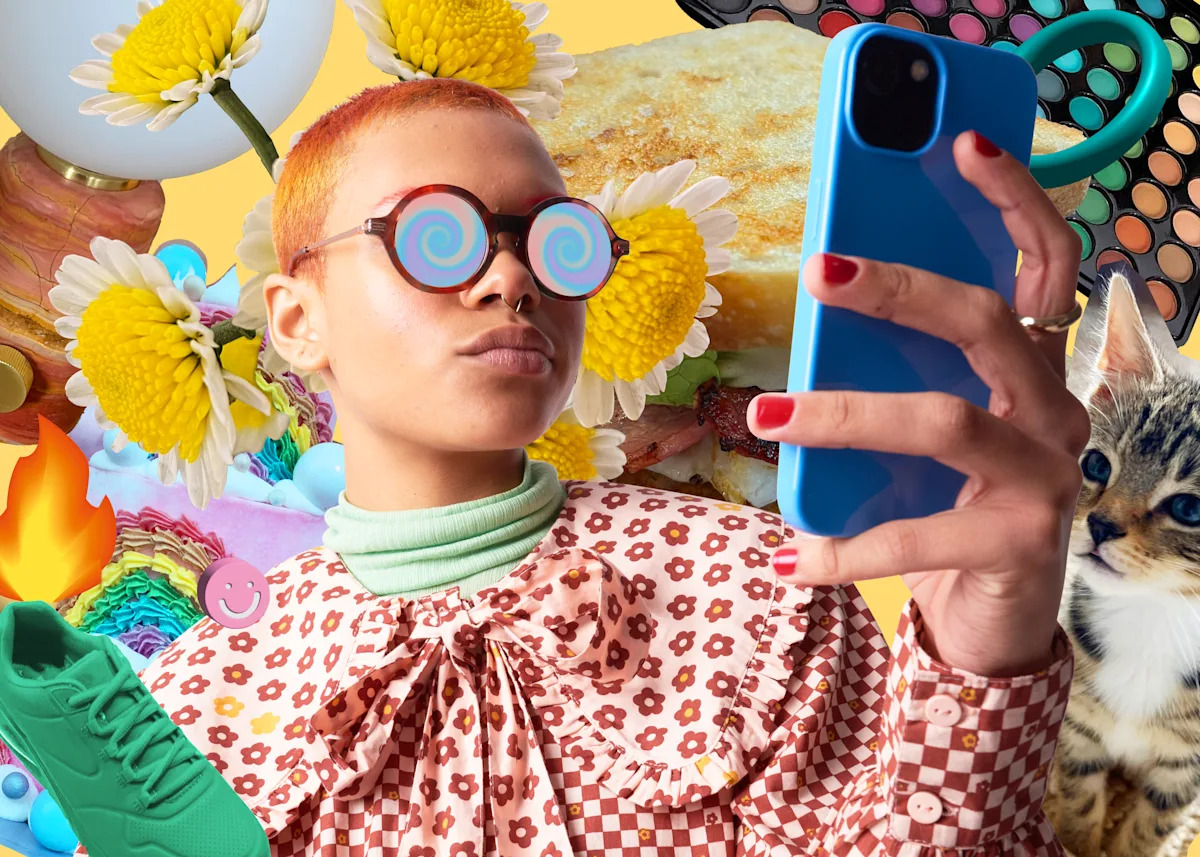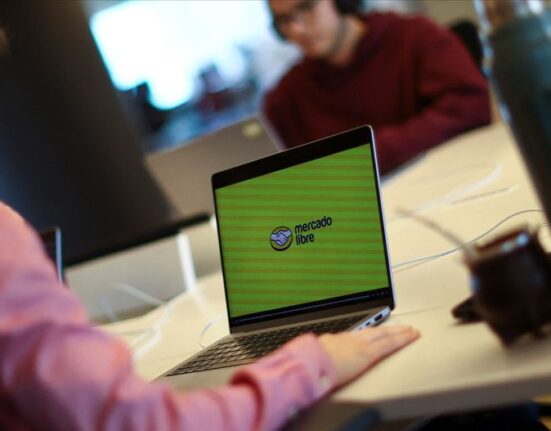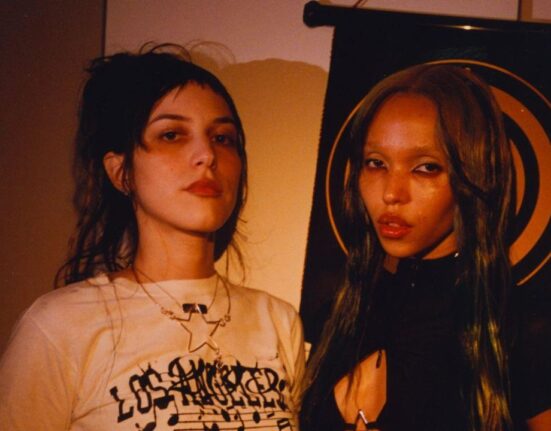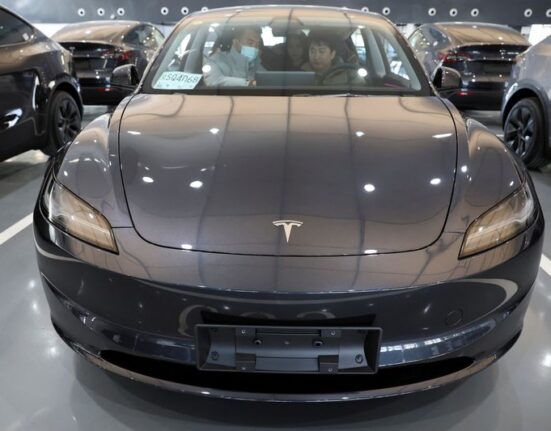ANAHEIM, Calif. — A child took the microphone in front of one of his favorite YouTubers, stumbling over his words but maintaining an upbeat tone. He wanted to know how to unlock a certain tool in Gorilla Tag, a virtual reality game in which players embody a legless primate. He probably was not old enough to play and definitely wasn’t old enough to have a YouTube channel, which would have been necessary for him to unlock that special tool.
VMT, a 19-year-old YouTuber with 1 million subscribers, smiles softly as he listens onstage. The child was one of dozens of young people lined up to ask him a question at VidCon, a convention for members of the creator economy and their fans. He was speaking on a panel titled “Building an Audience as a Niche Creator,” and there his audience was, gathering in the aisles for the chance to speak to him in real time.
“So, first step is getting a channel,” VMT laughs. “The second step is posting and then staying consistent. Just killing it. I feel like you can do it, bro.”
For at least 15 minutes, young people introduced themselves to VMT and his fellow panelists, sharing their channel niches and how many subscribers they have.
“I’m stuck at 334 subscribers — which, I’m thankful for all these people, but it’s a very small channel,” says a young person who introduces himself as Adam. He makes YouTube videos about the computer game Roblox, and wants to one day be famous enough to be a full-time creator.
He’s not alone.
A 2023 Morning Consult survey of 1,000 Gen Z respondents found that 57% polled want to be influencers. In a separate Morning Consult Survey of 2,204 U.S. adults who use social media, 41% said they wanted to be influencers as well.
Within the convention center walls of VidCon, pretty much everyone does, and it’s no surprise — influencers are these kids’ heroes to the point they’ll drag their parents to Anaheim, and instead of going to Disneyland, wait in line to ask a Gorilla Tag YouTuber a question.
Zach Katz, the cofounder and CEO of creator management company Fixated, tells Yahoo at VidCon that the “digital creator industry” has been “democratized from the beginning.” It’s easy for random people who work really hard to break into — more so than traditional entertainment like TV or film, he explains.
“If you stop two kids on the street today, one will tell you that they want to be a YouTuber. The other one will tell you they want to be a Twitch streamer,” Katz says. “The content space, [or] the digital entertainment space, has now become the leader in grabbing the hearts and minds [and] the dollars and attention of everybody from audiences to brands.”
Whether they’re emulating their personal idols, serious about their influencer careers or both, many of the kids in VMT’s audience wore shirts with their YouTube handles printed on them to make it easy for the new friends they met to follow them. Parents brokered deals with others, saying things like, “Your kid should follow my kid’s channel, and we’ll follow back.”
Becoming an influencer is like skinning a cat: There are a lot of ways to do it. I spoke to people with tried-and-true success stories about what it takes to make it big online. Here’s what they told me.
Find your niche
Many of the content creators at VidCon have a niche, whether it’s cooking meals from ingredients bought only from Dollar Tree (like Dollar Tree Dinners) or sharing videos of themselves solving Rubik’s Cubes (like SoupTimmy).
Iesha Vincent, a content creator who also coaches other creators to online success, tells me after VidCon that the industry is now “highly saturated, and it’s not as easy [to break out] as it was 10 years ago.”
“Viral moments don’t make lasting influencers — it’s having a super high unique voice and filling a space that isn’t already crowded, while deeply understanding your audience,” she explains.
It’s not just a strategy, it’s a necessity. Viveca Chow, an Instagram influencer, recommends that aspiring creators write down three things: 1. What they love, 2. What friends text them to ask about the most and 3. What they’re curious to learn more about.
“From there, you already have your three content pillars cut out for you,” she explains.
…but don’t make it too niche
SoupTimmy posts videos of himself solving Rubik’s Cubes for his 5.6 million YouTube subscribers. Though pretty much everyone’s familiar with the game, some of the terms and techniques are a little specialized. He had to find a balance.
“If you can figure out a way to have your niche translate to a wider audience, do it,” he tells me. “I don’t use that much terminology because I want to hit the broadest appeal possible and inspire people to hopefully get deeper into the niche.”
Double down
Ericka Bozeman, a video game streamer who now also has a true crime podcast, said on a VidCon panel that doubling down on her creator career made all the difference.
“The first thing I did was I immediately got an assistant, which sounds crazy. But once you’re making a little cash off of [your content], invest it in your business. I don’t care if you’re making $10,000,” she says. “I was literally livestreaming out of my parents’ basement making $17,000 per year … but the first thing I did was say, ‘OK, I need help to be able to do what I’m going to do.’”
Take refuge on a platform that takes care of you
As a creator, you can choose to invest in one platform over the other. TikTok, with its scarily accurate For You Feed algorithm, is one of the best social media sites to grow an audience. YouTube is pretty easy to monetize, and thanks to its ad revenue system, old videos can continue making you money long after they’re posted. But the platform I’ve heard creators praise as the most profitable is Snapchat.
Cheyenne Davis, who I first became familiar with as a star of MTV’s Teen Mom, identifies more as a Snapchatter than a creator or a reality TV personality. She tells me at VidCon that she posts on the app from 200 to 400 times per day, sharing every facet of her life, from cooking to parenting. She has about 250,000 followers there.
“With doing TV, [my audience] only got to see five-minute clips of my life, right? They don’t get to see the inside of things,” she says. “Now, with Snapchat, it’s opened up this door where I can post this much, and people don’t get mad. They almost get mad if I don’t post enough.”
She’s not just posting a ton. She’s making bank, and she’s not afraid to say it. For every few videos she shares to her story, Snapchat shows an ad. She then gets paid some of that ad revenue.
“I want everybody to know … You know how people get the idea that if [more people join in] the pie is going to get smaller? No, this one is going to grow,” Davis says. “It’s time for everybody to get on Snapchat.”
Don’t focus too much on monetization
To make content creation your full-time job, you have to find a way to earn money from it. Or do you?
Dhar Mann, who has 25.5 million YouTube subscribers and is ranked No. 2 on Forbes’s 2025 top creators list, makes inspirational scripted videos. He has his own content studio with 200 employees.
“For those who are aspiring to try to become a creator and make money, I would say don’t let that be your goal. Let the goal be to find your mission, to find your purpose, to try to inspire the world in some way,” he tells me at VidCon. “Then through that ‘why,’ ultimately, you will find your own place in this where you will be able to make a living through doing what you love.”
He made at least 100 videos before going viral enough to make money, admitting that he would have been discouraged if that was his ultimate goal. Now, he has an empire.
But, monetization is everything
The Dhar Mann method might not be for everyone. In fact, most of the people I talked to for this story mentioned the importance of monetization and treating your content creation like a business.
Kristin Marquet, founder and creative director of the publicity and branding company Marquet Media, helps boost the careers of creators without encouraging them to buy ads or hire production teams. She’s also a parenting influencer with 1.3 million followers on Instagram.
“Think like a business owner, not just a content creator,” she tells me after VidCon. “Whether you aim to secure book deals, establish brand partnerships or build your own company, creators who understand brand strategy, media positioning and audience psychology will progress further and faster.”
Full-time content creation isn’t just a pie-in-the-sky dream of children who are more familiar with YouTubers than TV stars. It’s the future of business.
The creator economy is massive, projected to have $500 billion flowing among platforms, influencers and audiences annually by 2027.
Going viral is not enough
Thanks to this new era of fine-tuned algorithms, it’s easier to go viral than ever. Going viral is no longer enough to launch a career, though it’s still not technically easy!
Lauren Taylor, CEO of the influencer agency Le Fleur Society, tells me that “if you don’t have a foundation, clear pricing, a strong pitch, a way to turn interest into income, you’ll either burn out or get taken advantage of.”
“Viral moments don’t make lasting influencers”
“Influencing is not just about being popular online,” she says. “It’s about being consistent, being strategic, and showing up like a professional. You have to know your value before anyone else will.”
Just keep at it
If you think this seems like a lot of work, you’re right. Dozens of content creators told me that they could correct people’s assumptions that influencing is easy. It’s hard.
Guy Golan, an associate professor in the department of strategic communication at Texas Christian University, teaches about social media. He tells me that it’s all about “delivering value to your followers day in and day out.”
“Content creation is like going to the gym, you need to do it several times a week for years if you want meaningful results,” he adds.
Make sure your stuff is actually worth watching
Katz and his Fixated cofounder Jason Wilhelm tell me at VidCon that not even hacking the algorithm or finding a niche is enough.
“If you’re not storytelling, if you’re not creating arcs, if you don’t have a high level of production, if you don’t have full teams to help you execute everything from ideation to creation to post-production, you’re going to be left behind,” Katz says.
Booking brand deals alone will not sustain your career, he says. You’ll need a manager, and a really good one, to help you truly thrive. But to get a manager — and to work with them — you’ll have to be a certain kind of person.
“A lot of it comes down to, No. 1, ‘Do they have personality? … that can transcend what they’re doing? … That people really want to get behind?” Wilhelm says. “Two, are they hard workers? Are these people just people that get up, press record and just go, or are they people who are like, ‘No, I’m going to build a business. I want to be in this space for 25 years.’”
Just don’t call yourself an influencer
One conversation stirring buzz at VidCon is the reality that “influencer” is becoming a dirty word. Call them content creators.
Part of that reason is because the title gets a bad rap — it’s equated with annoying selfie-taking and self-absorption. Perhaps it’s easiest to leave the term behind than try to rehabilitate it. After all, you don’t have to wield influence over a huge audience to make a career out of posting online.
Hank Green, the cofounder of VidCon and a longtime content creator with millions of subscribers across several social channels, is definitely influential. He was just inducted into VidCon’s first Hall of Fame, which honors creators who have shaped the internet.
After the ceremony, he tells me there’s something he could correct the record on when it comes to his job: At its core, it’s really more of a hobby.
“It’s like being a musician. Just think of it like that. There’s skill, there’s techniques. Most people who do it, do it because they love it, not because they’re going to be Beyoncé,” he said. “Beyoncé is a musician, but so is Tom Catmull, the guy who plays at the bar near my house.”
“It’s something that you develop a lot of skills [in] while you’re doing it. And it’s lovely and you build community. I just think that we think of [content creation] too much as just a bunch of startups when really, it’s a bunch of creatives,” he said.
You’ll need tools and drive to be successful as a creative, though, just like a businessperson. Thankfully, many of the most successful creators working right now are willing to share their secrets.












Leave feedback about this